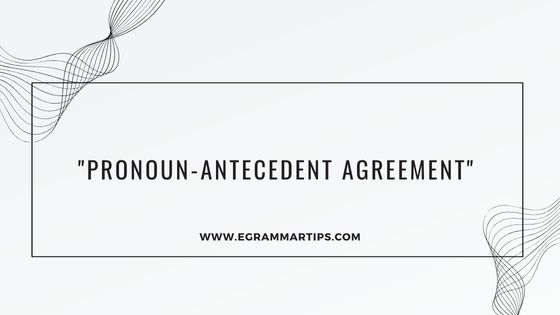
Table of Contents
ToggleWhat is Pronoun-Antecedent Agreement?
Pronoun-antecedent agreement refers to the rule that a pronoun must agree with its antecedent in number, gender, and person. The antecedent is the noun or noun phrase that the pronoun refers to or replaces in a sentence.
For example:
John forgot his book.
Here, “John” is the antecedent, and “his” is the pronoun that must agree with the antecedent in gender and number.
Key Rules of Pronoun-Antecedent Agreement
1. Agreement in Number
A pronoun must agree with its antecedent in singular or plural form.
•Singular Antecedent, Singular Pronoun:
The student forgot his backpack.(Here, “student” is singular, so “his” is singular too.)
•Plural Antecedent, Plural Pronoun:
The students forgot their backpacks.(Since “students” is plural, we use the plural pronoun “their.”)
2. Agreement in Gender
A pronoun should also agree in gender with its antecedent.
•Masculine Gender:The boy forgot his jacket.
•Feminine Gender:The girl forgot her homework.
•Neutral Gender:For things or when gender is unknown, use neutral pronouns like “it” or “they” (for non-binary people or mixed groups).The book is on the table. It is blue.
3. Agreement in Person
Pronouns must agree with the person of their antecedent, whether first person, second person, or third person.
•First Person:I lost my keys.
•Second Person:You forgot your phone.
•Third Person:He forgot his wallet.
Common Challenges with Pronoun-Antecedent Agreement
1. Indefinite Pronouns as Antecedents
Indefinite pronouns like anyone, everybody, someone, each, and nobody are singular and require singular pronouns, even though they may seem to refer to multiple people.
•Everyone should bring his or her own lunch.
•Each of the players has his or her own locker.
For a more inclusive and modern approach, they can be used as a singular pronoun:l
•Everyone should bring their own lunch.
2. Collective Nouns
Collective nouns (e.g., team, group, committee) are singular when referring to the group as a whole but can be plural when emphasizing the individuals within the group.
•The team won its first game. (Singular, referring to the team as one entity)
•The team celebrated their individual successes. (Plural, emphasizing the team members as individuals)
3. Compound Antecedents
When two or more nouns are joined by and or or, the pronoun must agree with the compound antecedent.
•Joined by “and” (Plural Antecedent):
John and Sarah will bring their books
•.Joined by “or” or “nor” (Singular or Plural):
When the antecedents are singular and connected by “or” or “nor,” use a singular pronoun.
Neither Jane nor Lisa has finished her homework.
•If one part of the compound antecedent is plural, the pronoun must agree with the closest antecedent.
Neither the teacher nor the students have turned in their assignments.
4. Pronouns with “Each” and “Every”
When using each or every before nouns, the antecedent is singular, requiring a singular pronoun.
•Each of the employees must submit his or her report by Friday.
•Every student should bring his or her own materials.
5. Gender-Neutral and Singular
“They”In contemporary English, singular they is increasingly accepted to refer to a person whose gender is unknown or non-binary.
•Someone left their phone on the table.
•If a student finishes early, they can leave the classroom.
Examples of Correct Pronoun-Antecedent Agreement
1. Singular Antecedent with Singular Pronoun:The teacher finished grading her papers.
2. Plural Antecedent with Plural Pronoun:The dogs ran through their yard.
3. Indefinite Pronoun Antecedent:Somebody left their umbrella.
4. Collective Noun as Antecedent:The team will defend its title in the finals.
5. Compound Antecedent:Neither John nor Sarah has completed their project.
Common Mistakes and How to Fix Them
1. Incorrect: Everyone should do their best.
Correct: Everyone should do his or her best.
(Although singular “they” is becoming more accepted, “his or her” is traditionally correct.)
2. Incorrect: The team celebrated their victory.
Correct: The team celebrated its victory.
(The team, as a unit, takes a singular pronoun.)
3. Incorrect: Each of the students forgot their homework.
Correct: Each of the students forgot his or her homework.
(Each is singular, so the pronoun must be singular.)
Practice Exercises
1. Correct the pronoun-antecedent error:
Neither John nor his friends has finished their assignments.
2. Select the correct pronoun:
Every student must submit (his or her / their) assignment by Friday.
3. Rewrite the sentence using singular they:
Someone left his or her jacket on the chair.
Conclusion
Pronoun-antecedent agreement is essential for clear, grammatically correct writing and speaking. Ensuring that pronouns match their antecedents in number, gender, and person helps to avoid confusion and ambiguity. While traditional rules require strict adherence to gendered pronouns, modern usage allows more flexibility, especially with the acceptance of singular they. By mastering this agreement, you’ll greatly improve your writing’s clarity and professionalism.